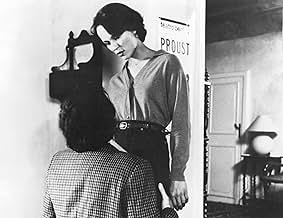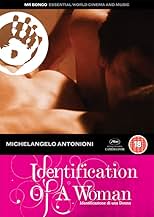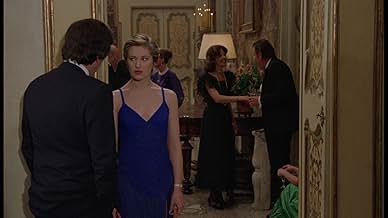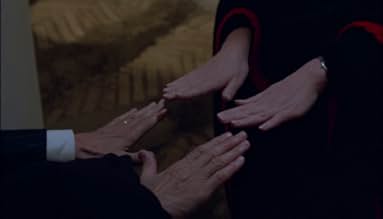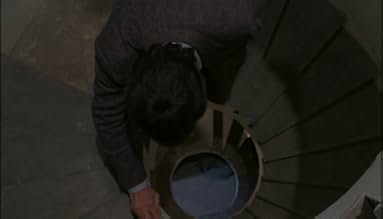CALIFICACIÓN DE IMDb
6.6/10
3.5 k
TU CALIFICACIÓN
Agrega una trama en tu idiomaA director's wife leaves him. He pursues another woman who also departs. This inspires a movie idea about women's relationships. He searches for an actress to star in the film and his life.A director's wife leaves him. He pursues another woman who also departs. This inspires a movie idea about women's relationships. He searches for an actress to star in the film and his life.A director's wife leaves him. He pursues another woman who also departs. This inspires a movie idea about women's relationships. He searches for an actress to star in the film and his life.
- Dirección
- Guionistas
- Elenco
- Premios
- 1 premio ganado y 5 nominaciones en total
Enrica Antonioni
- Nadia
- (as Enrica Fico)
Giampaolo Saccarola
- The Gorilla
- (as Gianpaolo Saccarola)
Dado Ruspoli
- Mavi's Father
- (as Alessandro Ruspoli)
Pier Francesco Aiello
- Young Man at Party
- (as Pierfrancesco Aiello)
Carlos Alberto Valles
- Close-Up Man
- (as Carlos Valles)
Opiniones destacadas
Antonioni's last film prior to his suffering a stroke is this very typical effort (co-written with Gerard Brach and Tonino Guerra), dealing with a number of key themes that run through his work – lack of communication, the mystery-as-journey-of-self-discovery, etc. That said, the film wasn't picked up for U.S. release until 1996 and is consequently perhaps the least-seen of Antonioni's films from his post-AVVENTURA phase!
Anyway, the mystery element links the film with the director's earlier BLOW UP (1966) and THE PASSENGER (1975); still, it's never as intriguing here as in those more celebrated titles (especially since, for once, it's explained away at the end!) but, as I said, the film eventually emerges to be more about the mid-life crisis of its central character (despite the title). Interestingly, he's a film director – though "Euro-Cult" favorite Tomas Milian feels as incongruous to Antonioni's cinema as Marcello Mastroianni's presence had been in LA NOTTE (1961)! He has an obsessive relationship with a young woman (even enjoying some LAST TANGO IN Paris [1972]-type sex scenes!) who eventually leaves him and disappears (shades also of L'AVVENTURA [1960]); while searching for her, he meets a variety of other willing girls (among them Antonioni's own future wife Enrica Fico). Marcel Bozzuffi appears in one brief, irrelevant scene as Milian's brother.
Overall, the film is tiresomely long and often mirrors the tedium experienced by the characters; the ending, however, is a beauty – suggesting that, even if he's a failure at love, a film director is still left with his imagination. Carlo Di Palma's cinematography is notable, too – particularly at the Venice location (where, coincidentally, I saw the Antonionis three years ago!) and during the tense fog-bound sequence; the film's score, then, is a mix of electronic, ambient and pop – and all very much of its period. As was the case with THE PASSENGER, THE MYSTERY OF OBERWALD (which is now one of only two features by the director I've yet to catch up with!) and BEYOND THE CLOUDS (1995), Antonioni had a hand in the editing of the film; here, he receives sole credit for this and the result makes especially effective use of ellipses (the factors of time and space had always been a primary concern in his work – thus making the apparently mocking recourse to science-fiction at the end anything but coincidental!).
Anyway, the mystery element links the film with the director's earlier BLOW UP (1966) and THE PASSENGER (1975); still, it's never as intriguing here as in those more celebrated titles (especially since, for once, it's explained away at the end!) but, as I said, the film eventually emerges to be more about the mid-life crisis of its central character (despite the title). Interestingly, he's a film director – though "Euro-Cult" favorite Tomas Milian feels as incongruous to Antonioni's cinema as Marcello Mastroianni's presence had been in LA NOTTE (1961)! He has an obsessive relationship with a young woman (even enjoying some LAST TANGO IN Paris [1972]-type sex scenes!) who eventually leaves him and disappears (shades also of L'AVVENTURA [1960]); while searching for her, he meets a variety of other willing girls (among them Antonioni's own future wife Enrica Fico). Marcel Bozzuffi appears in one brief, irrelevant scene as Milian's brother.
Overall, the film is tiresomely long and often mirrors the tedium experienced by the characters; the ending, however, is a beauty – suggesting that, even if he's a failure at love, a film director is still left with his imagination. Carlo Di Palma's cinematography is notable, too – particularly at the Venice location (where, coincidentally, I saw the Antonionis three years ago!) and during the tense fog-bound sequence; the film's score, then, is a mix of electronic, ambient and pop – and all very much of its period. As was the case with THE PASSENGER, THE MYSTERY OF OBERWALD (which is now one of only two features by the director I've yet to catch up with!) and BEYOND THE CLOUDS (1995), Antonioni had a hand in the editing of the film; here, he receives sole credit for this and the result makes especially effective use of ellipses (the factors of time and space had always been a primary concern in his work – thus making the apparently mocking recourse to science-fiction at the end anything but coincidental!).
This is probably obvious, but if you don't like Antonioni, stay away from Identification of a Woman. If you've never seen another, check out one of these films first: L'Avventura, La Notte, L'Eclisse, Red Desert, Blowup, The Passenger, or Zabriskie Point. If you are a fan of Antonioni, like myself, please do check out this film. It is definitely one of Antonioni's weaker films, but it is still undeniably in his style and containing his regular themes. This one is about a film director who can be said to fall in love with a woman (who, incidentally, looks a lot like a very young and extraordinarily thin version of Monica Vitti), but he can't express that love. The woman is upset at this and disappears. In some ways, this is like a weaker version of L'Avventura. The man tries to get on with his life, begins dating again, but eventually realizes that his mind revolves around the girl who abandoned him. This film is disappointing, especially if you're in love with Antonioni the director. The direction is generally flat. Only a few scenes show his supreme visual style. 6/10.
Possibly the most atmospheric film I ever seen, it made a huge impact when I first saw it, and that opinion has never changed. If there is one film that conveys the mystery of life this is it. It is also a highly evocative picture of Italy from the perspective of the upper middle classes in the late Seventies. Crying out for a DVD release as the photography was excellent too on the original film showings.
As introduced by Lorenzo Codelli, Identification of a Woman was presented in the Cannes Film Festival in 1982 and received a special anniversary award. It's like a personal movie because the lead character Niccolo (Tomas Milian) is a film director, and tells of a personal crisis of the filmmaker. Niccolo was played by a leading Italian actor of the time, Tomas Milian, who was famous for his roles in Italian spaghetti westerns, and was an action star. This was essential the last feature film made by Michelangelo Antonioni before his stroke, before which he spent most of the 80s publishing short stories and exhibiting his abstract paintings.
And personally, my bad track record with Antonioni's post L'Eclisse movies unfortunately continues. I'm pretty sure I'm missing something very obvious (or could be it so subtle it eludes me?) that I'm finding each of them quite difficult to sit through (save for perhaps The Passenger), and to try and see its underlying meaning. Perhaps I am just scratching the surface and in doing so, fail to appreciate what the movie's about and for.
Or maybe Identification of a Woman is indeed the weaker of the lot, because of certain resemblance to plot design with his earlier masterpieces? For starters there seemed to be some repetitive themes revisited, but that I'm fine with because it made it easier to click with and connect. Just like how Niccolo and his squeeze Mavi (Daniela Silverio) spend considerable time at an emotionally empty high society party reminiscent of that in L'Notte, where they nurse issues from the heart, as well as for one to come to terms with the other's secret admirer.
Surely the sex is good, and the movie wastes absolutely no time in getting beneath the sheets for some surprisingly erotic time of a horizontal tango complete with underarm forests, but naturally physical love doesn't compensate for emotional depth absent between the lovers, highlighting something inherent wrong in their relationship. Having anonymous threats made to Niccola also didn't help, as he experienced first hand how these threats got carried out to hurt those he loved. We spend a bit of time with their attempts to escape from a stalker, and even had a technically brilliant sequence involving a deep mist that I thought contemporary movies like Frank Darabont's The Mist, or the video game movie adaptation of Shallow Hill, had taken a huge leaf from.
For Niccolo's inability to declare his love and address their conflicts, we get a dose of L'Avventura here. Mavi disappears, and we don't really get to see much of her thereafter. Niccolo tries to launch a search, and we get into the second half of the movie where we see his new relationship with a young actress Ida (Christine Boisson). But of course there are issues to grapple with here, and I thought was something I'd understand as well, and that's the continued holding out of the candle for someone else, together with the notion of love versus need, and serving as an emotional crutch. It's not fair of course, but there's more challenges ahead for Niccola in his relationship with Ida to accept, but by the time we get to it, I'd more or less didn't really care for Niccola anymore.
Which probably contrasted to a statement which Lorenzo Codelli shared about what Antonioni said regarding this movie being about its characters. I thought his earlier movies had stronger and more interesting characters, or at least those who can hook my attention down and allowed me to care for them a bit, versus those in this movie. Then again, I suspect I may be on a different wavelength since I enjoyed most of Antonioni's earliest works in the 50s, as compared to the more contemporary ones shown this week so far.
And personally, my bad track record with Antonioni's post L'Eclisse movies unfortunately continues. I'm pretty sure I'm missing something very obvious (or could be it so subtle it eludes me?) that I'm finding each of them quite difficult to sit through (save for perhaps The Passenger), and to try and see its underlying meaning. Perhaps I am just scratching the surface and in doing so, fail to appreciate what the movie's about and for.
Or maybe Identification of a Woman is indeed the weaker of the lot, because of certain resemblance to plot design with his earlier masterpieces? For starters there seemed to be some repetitive themes revisited, but that I'm fine with because it made it easier to click with and connect. Just like how Niccolo and his squeeze Mavi (Daniela Silverio) spend considerable time at an emotionally empty high society party reminiscent of that in L'Notte, where they nurse issues from the heart, as well as for one to come to terms with the other's secret admirer.
Surely the sex is good, and the movie wastes absolutely no time in getting beneath the sheets for some surprisingly erotic time of a horizontal tango complete with underarm forests, but naturally physical love doesn't compensate for emotional depth absent between the lovers, highlighting something inherent wrong in their relationship. Having anonymous threats made to Niccola also didn't help, as he experienced first hand how these threats got carried out to hurt those he loved. We spend a bit of time with their attempts to escape from a stalker, and even had a technically brilliant sequence involving a deep mist that I thought contemporary movies like Frank Darabont's The Mist, or the video game movie adaptation of Shallow Hill, had taken a huge leaf from.
For Niccolo's inability to declare his love and address their conflicts, we get a dose of L'Avventura here. Mavi disappears, and we don't really get to see much of her thereafter. Niccolo tries to launch a search, and we get into the second half of the movie where we see his new relationship with a young actress Ida (Christine Boisson). But of course there are issues to grapple with here, and I thought was something I'd understand as well, and that's the continued holding out of the candle for someone else, together with the notion of love versus need, and serving as an emotional crutch. It's not fair of course, but there's more challenges ahead for Niccola in his relationship with Ida to accept, but by the time we get to it, I'd more or less didn't really care for Niccola anymore.
Which probably contrasted to a statement which Lorenzo Codelli shared about what Antonioni said regarding this movie being about its characters. I thought his earlier movies had stronger and more interesting characters, or at least those who can hook my attention down and allowed me to care for them a bit, versus those in this movie. Then again, I suspect I may be on a different wavelength since I enjoyed most of Antonioni's earliest works in the 50s, as compared to the more contemporary ones shown this week so far.
10Xanadu-2
A very beautiful film with that special Antonioni atmosphere. I can identify with the feeling of emptiness and the people who can´t really communicate with each other. Modern life and adulthood seems shallow and a bit soulless. You have to fill it with something and make it human again.
The first time I saw it I was disapointed but it improved greatly with the second viewing and I want to see it again. There are new things to discover each time as with all of Antonionis´ films.
The first time I saw it I was disapointed but it improved greatly with the second viewing and I want to see it again. There are new things to discover each time as with all of Antonionis´ films.
¿Sabías que…?
- TriviaThe last feature film Michelangelo Antonioni made before his debilitating stroke.
- ConexionesFeatured in Tonino Guerra: A Poet in the Movies (2008)
- Bandas sonorasThe Fire Inside
Written by Steve Hillage and Monique Giraudy (as Miquette Giraudy)
Performed by Steve Hillage
Published by Virgin Music Publishers
Selecciones populares
Inicia sesión para calificar y agrega a la lista de videos para obtener recomendaciones personalizadas
- How long is Identification of a Woman?Con tecnología de Alexa
Detalles
- Fecha de lanzamiento
- Países de origen
- Idiomas
- También se conoce como
- Identification of a Woman
- Locaciones de filmación
- Productoras
- Ver más créditos de la compañía en IMDbPro
Taquilla
- Total a nivel mundial
- USD 1,605
Contribuir a esta página
Sugiere una edición o agrega el contenido que falta

